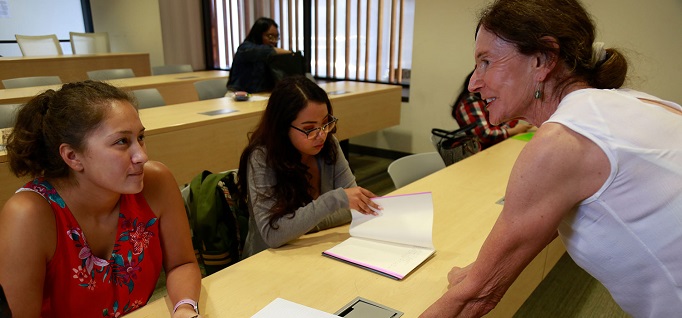Building a teacher pipeline
By David Ogul
December 3, 2019
As teacher shortages grow in California, a college and its partners are working to train the next generation of educators.
San Diego Mesa College is working to mold a new generation of K-12 educators from diverse backgrounds that reflect the students they teach. The college is partnering with the San Diego Unified School District, San Diego State University, and National University on the Teacher Pathway Inclusion Program.
The program was launched in April and calls for a bevy of support services in creating a seamless route for high school students to earn a bachelor of arts degree and teaching credential, with an emphasis on filling a growing need in science, math, or special education. Mesa College will aim to enroll 50 students transitioning from San Diego Unified each year, with a goal of transferring 30 of those students to National University after two years. San Diego Unified staff is tasked with identifying potential future educators from the ranks of middle and high school students, providing them with the counseling and support needed to reach their goals.
In addition, Mesa College is partnering with San Diego State University on a separate, but related, five-year, federally-funded initiative to grow the number of students transferring into SDSU’s bilingual credential program. Mesa College is hoping to send between 20 and 30 students per year to SDSU through the initiative.
“We need to get more teachers of color into our schools,” said Mesa College Professor Laurie Lorence, who is among those in the San Diego Community College District coordinating the Teacher Pathway Inclusion Program. Indeed, a recent study from the nonprofit Learning Policy Institute found teachers of color boost the academic performance of students of color.
“We want to bring teachers to the classroom who come from the community and who mirror the community,” Mesa College Vice President of Instruction Isabel O’Connor said.
The initiatives come as California is issuing a record number of interim and emergency credentials to teachers to help fill a growing number of staffing shortages. Eighty percent of California public school districts taking part in a Learning Policy Institute survey said they experienced a shortage of qualified teachers for the 2017-18 school year. The more than 10,000 interim credentials, permits and waivers issued in 2015-16 were more than double the number issued just three years earlier.
The Teacher Pathway Inclusion Program – funded by Stephen Cushman of the Cushman Foundation, Peter Ellsworth of the Legler Benbough Foundation, and National University – is the more comprehensive of the initiatives. San Diego Unified students in the program will take dual enrollment courses that count toward both their high school and college diplomas. By providing future teachers free college courses in high school, a free college education at Mesa College through the San Diego Promise, and discounted bachelor’s degree and teaching credential at National University (no one would pay more than $7,000 per year and most will have their National University tuition covered through grants and scholarships), more doors are being opened for a growing number of prospective teachers of color.
“Many of the students we’re going after are students who never saw college as an option,” O’Connor said.
The Teacher Pathway Inclusion Program has been under development for the past few years in coordination with National University and its Sanford College of Education, which is the largest single producer of teaching credential candidates in California and among the largest schools of education in the country.
“We have been engaging in faculty discussion and administrator discussions, everybody is vested and is working in tandem on how to best prepare students as they transition and on how to make sure they succeed,” said O’Connor.
The results will be almost immediate. Among the dual enrollment courses taught to participating high school students is a tutor-training class. Those who complete the course are eligible to serve as high school tutors.
Read the full article here.



